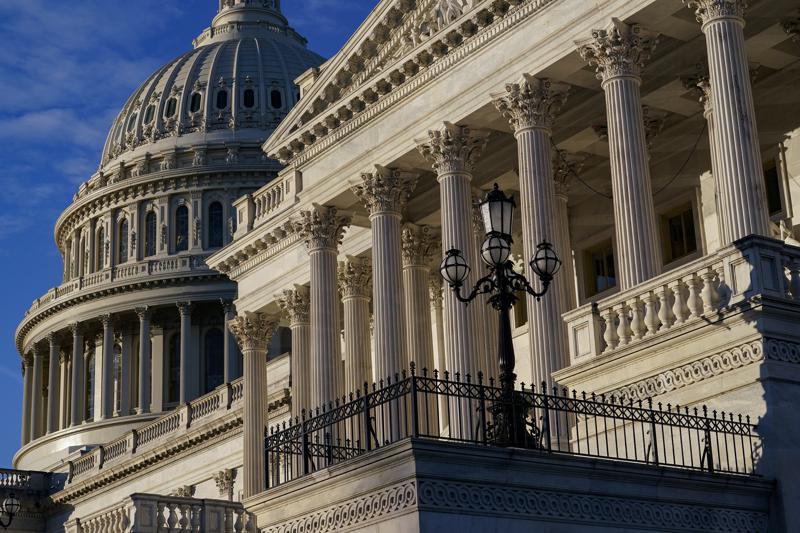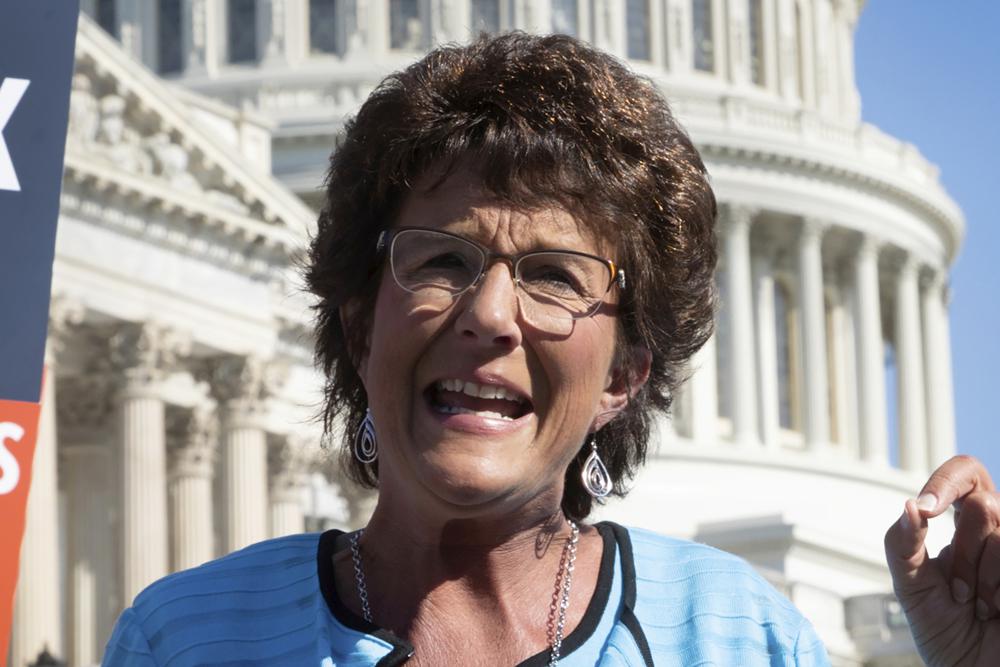Britt calls incoming freshman of GOP Senators “the kind of fresh blood needed”

Senator-elect Katie Britt released a statement praising the group of freshmen Republican Senators entering the U.S. Senate following the Senate Republican Caucus’s meeting and leadership elections on Wednesday. “Our incoming freshman class of Republican senators represents the kind of fresh blood needed to help get our country back on the right track, and I’m going to bring that perspective to our caucus every single day,” Britt said in a statement. “I believe that having this spirited internal debate on how we can best fight to put American families first and defend our conservative values is good for our party and good for our country. Now, it’s time to move forward together as a united front determined to do everything in our power to stop President [Joe] Biden and his congressional allies from crushing hardworking Alabamians and Americans even further. The first step, and where our full focus must be, is helping Herschel Walker win in Georgia.” The GOP Senate Caucus voted during the meeting to keep Sen. Mitch McConnell as the Senate Minority Leader. McConnell beat back a challenge from Sen. Rick Scott, who headed the National Republican Senatorial Committee (NRSC) during the recent midterm elections. Senate Republicans are still shocked by their poor performance in the midterm elections that many pollsters had reported would go their way. The GOP lost close Senate elections in Pennsylvania, Arizona, and Nevada that would have flipped control of the Senate to Republicans. Scott criticized McConnell for failure to articulate a Republican message prior to the election. Sens. Tom Cotton and John Barrasso nominated McConnell, while Sen. Ron Johnson nominated Scott. “Every one of our candidates knew what they were for, expressed it quite clearly,” McConnell said. “It’s pretty obvious, and all of you have been writing about it, what happened. We underperformed among independents and moderates because their impression of many of the people in our party in leadership roles is that they’re involved in chaos, negativity, excessive attacks, and it frightened independent and moderate Republican voters.” Some observers believed that McConnell was making a veiled reference to former President Donald Trump, who announced Tuesday night that he was once again running for the Republican nomination for President in the 2024 election. Two McConnell-controlled outside groups, One Nation and the Republican Leadership fund spent $363 million on the midterm elections – significantly more than Scott and the NRSC. McConnell won reelection as Senate GOP leader 37 to 10, with one member abstaining. Republican nominee for Senate Herschel Walker is in a December 6 runoff election with incumbent Sen. Raphael Warnock. Despite the disappointing Senate performance, Republicans did win control of the U.S. House of Representatives. This means that Kevin McCarthy will likely replace Nancy Pelosi as Speaker of the House. Britt defeated Democratic nominee Dr. Will Boyd and Libertarian John Sophocleus a week ago in the general election on November 8 to win the open Senate seat. Clay Armentrout and Sean Ross are heading Britt’s transition team. To connect with the author of this story, or to comment, email brandonmreporter@gmail.com.
Several U.S. Senate and House races remain too close to call as vote counts trickle in

Two days after Election Day, several races are still too close to call, leaving the fate of the U.S. House and Senate hanging in the balance. FiveThirtyEight currently has 210 Republican House seats compared to 200 for Democrats, leaving both short of the 218 needed to control that chamber. The House is still leaning toward Republicans, though, with expected House Speaker Rep. Kevin McCarthy, R-Calif., declaring Republican control. Nancy Pelosi has not publicly weighed in, even as many wait to see if she will retire from leadership. In fact, some races are separated by only a handful of votes. Outspoken supporter of former President Donald Trump, Rep. Lauren Boebert, R-Colo., is leading her opponent by fewer than 400 votes at time of publication. Arizona, California, Nevada, and other states also have close House races. Control of the Senate is still undecided and may come down to a Dec. 6 Georgia runoff between Republican Herschel Walker and Democrat Raphael Warnock. Arizona’s Senate race is not called, though Democrat Mark Kelly leads Republican Blake Masters roughly 51.4% to 46.4%. The Arizona Secretary of State’s website indicates 100% of precincts reporting, but Maricopa County is still reportedly working through hundreds of thousands of mail-in ballots turned in on Tuesday. In Nevada’s uncalled Senate race, Republican Adam Laxalt leads Democrat Catherine Cortez Masto 49.4% to 47.6%, with 83% reporting. Gubernatorial races are tight as well. The closely watched governor’s race in Arizona has Republican Kari Lake behind Democrat Katie Hobbs by about 13,000 votes as counts continue Thursday. Overall, election night disappointed many Republicans who hoped for the “red wave.” “So after all the analysis, it is clear the most likely case is both houses of Congress will go Red and the mega states of TX and FL go redder,” Matt Schlapp, chair of the Conservative Political Action Committee, wrote on Twitter. “We lost too many close races, but all in all, I go back to VA very pleased.” Former President Donald Trump has taken criticism after many of the candidates he backed did not fare well, but he pushed back against those critiques in a string of posts on Truth Social Wednesday and Thursday. “Incredible how dishonest the Fake News Media is,” he wrote. “The Failing New York Times has gone crazy. So many of the people I Endorsed went on to victory on Tuesday Night, nobody was even close, and they literally make up a story refusing to write the facts, and only quoting enemies and losers. Almost all of the people I endorsed WON, yet if you read the story from two Trump hating writers (who only do as they are told!), you would not even recognize the truth.” Speaking at a press conference Wednesday, President Joe Biden said he always expected Democrats to do “fine” and wants to work with Republicans going forward. “While we don’t know all of the results yet – at least, I don’t know them all yet – here’s what we do know,” he said. “While the press and the pundits are predicting a giant red wave, it didn’t happen. And I know you were somewhat miffed by my – my [sic] optimism, but I felt good during the whole process. I thought we were going to do fine. “The American people have made clear, I think, that they expect Republicans to be prepared to work with me as well,” he added. Republished with the permission of The Center Square.
U.S. Senate is focus of politicos across the country

In Alabama, with hours left in the 2022 election cycle, the Republican nominee for U.S. Senate, Katie Britt, appears to be a prohibitive favorite over Democratic nominee Dr. Will Boyd and Libertarian nominee John Sophocleus for the open U.S. Senate seat, currently held by the retiring Richard Shelby. Nationally, though, there is intense speculation over what could happen on election day on Tuesday and which party will control the next Congress. Polling shows Republicans with growing momentum, and it appears almost a certainty that the GOP will take control of the U.S. House of Representatives after four years of Nancy Pelosi’s leadership, and it does not appear to even be close. Real Clear Politics does not see any of Alabama’s Seven Congressional Districts as even being in play in this election. With the House effectively lost to them, Democrats have focused their efforts on maintaining their narrow control of the U.S. Senate, which for the past two years has been tied 50 to 50; but Vice President Kamala Harris gives the Democrats control of the body. Democrats had staked their hopes on the Select Committee on January 6, and the abortion issue to energize their base. That has not happened. Instead, Republicans are running on inflation, crime, the border, and economic issues, and that strategy appears to be playing well with voters. It is too close to call who will control the Senate before the votes are counted, but clearly, the trend has been moving in favor of the GOP in the last three weeks. The best opportunity for a Republican pickup appears to be Nevada. There, the Republican challenger, former state Attorney General Adam Laxalt, is leading Democratic incumbent Sen. Catharine Masto in recent polling. The latest Real Clear Politics rolling poll average has Laxalt leading Masto by 1.9 points. The best opportunity for a Democratic pickup appears to be Pennsylvania, where Republican incumbent Sen. Pat Toomey is retiring even though he is only 60 years old. Toomey’s controversial vote in 2021 to convict former President Donald Trump of inciting the January 6 insurrection made his ability to win a Republican primary unlikely. Democratic lieutenant Governor John Fetterman had appeared to have an insurmountable lead over Republican nominee television host Dr. Mehmet Oz, but that lead has evaporated. The race is now a tossup, but Oz has the momentum after clearly besting Fetterman in the debate. Presidents Barack Obama and Joe Biden are both campaigning hard for Fetterman, and Trump is campaigning for Oz. Both parties recognize that there is little chance of the Democrats holding on to the Senate if Pennsylvania falls to the GOP. Georgia is a tossup between Democratic incumbent Sen. Raphael Warnock and college football star Republican challenger Hershel Walker, but Walker clearly has the momentum in this race. Due to Georgia’s election rules, however, this race will likely go to a December runoff. Warnock is being dragged down in the general election by the terrible performance of Democratic gubernatorial candidate Stacey Abrams. Brian Kemp is sure to best Abrams on Tuesday. If Walker faces Warnock again on December 6, however, will those Kemp voters come out to help the Republicans lift Walker over Warnock? The trifecta of Pennsylvania, Nevada, and Georgia likely decide the Senate, but there are other races where Democratic incumbents are fighting for their political lives. In New Hampshire, Democratic incumbent Sen. Maggie Hassan is leading Republican challenger Dan Bolduc, but this race is much closer at this point than politicos expected this summer. If there really is a Republican “red wave” where GOP voters come out to the polls on Tuesday with more enthusiasm than Democrats, then the Granite state could easily swing to the GOP. According to the latest Real Clear Politics rolling poll average, Hassan has a lead of just .8 – well inside the margin of error and trending in the wrong direction for Hassan. Another state where a “red wave” could unseat a Democratic incumbent is Arizona. This summer, it appeared that incumbent former astronaut and the husband of former Congresswoman Gabby Giffords, Sen. Mark Kelly, would win easy reelection by more than ten points. Now this race is much closer than even the most enthusiastic GOP supporters thought possible. Republican nominee Blake Masters has won over a lot of voters. If the GOP candidate for Governor wins and wins big, Arizona could be a surprise U.S. Senate pickup for the GOP. This race has been a tie in two of the last 5 polls, with Kelly’s best performance being plus three in a Marist poll. Both Remington and Fox News have Kelly leading by just one point. If Republicans flip Arizona, there is little likelihood of the Democrats holding on to the Senate. In the summer, the Democrats believed that Republican incumbent Ron Johnson in Wisconsin was very vulnerable. Those hopes are fading fast as Johnson is surging in the polls over Democratic challenger Lt. Gov. Mandela Barnes. Senate colleague Bernie Sanders is on the ground campaigning for Barnes this weekend. Johnson leads Barnes by 3.2 points in the most recent Real Clear Politics rolling average. If there is no GOP wave, this could be closer than the polls indicate, and a Barnes upset win is still not outside the realm of possibility. In Washington state, even Republicans were expecting incumbent Sen. Patty Murray to coast to another easy re-election. That race is now much closer than anyone had previously thought possible. Republican challenger Tiffany Smiley has pushed Murray far harder than anyone could have anticipated in this blue state. Murray was consistently polling nine points or more in September, but recent polling has shown her lead shrink to just 1 to 4 points. The Real Clear Politics still has Murray up by 3.0 points in their most recent polling average, but that has dropped from 9 points just four weeks ago. This would still be an unlikely pickup for Republicans in a state that Biden won by 19.2 points just two years ago. That said, a Smiley victory is now within the margin of error in some recent polling. Murray holding on to her seat remains the most likely outcome, but that is now far from certain. In North Carolina, Republican incumbent Sen. Richard Burr is retiring. This seemed to be an opportunity for Democrats to flip this red seat blue, and Civitas/Cygnal had the race between Republican Ted Budd and Democratic nominee Cheri Beasley tied as recently as September 26, but Budd appears to
Robert Aderholt and Republican leadership urge Joe Biden to invest in American energy

Congressman Robert Aderholt joined House Republican Whip Steve Scalise (R-Louisiana), HEAT Co-Chairs Rep. Jeff Duncan (R-South Carolina) and Rep. Markwayne Mullin (R-Oklahoma), and 126 other members in a letter led by Whip Scalise to President Joe Biden urging the President to reverse what the GOP calls “his anti-American energy policies. “President Biden has no plans, or desire, to lower energy costs for the long term,” Rep. Aderholt warned on social media after Biden made his pre-election final release of America’s Strategic Petroleum Reserves. “Instead, he releases oil from our emergency supply to try and bring them down ahead of the election. Basically, a gimmick. We need more American energy and a real energy plan. Not an election gimmick.” Congressman Mike Rogers agreed with Aderholt’s assessment of the release four weeks before the election. “Biden is depleting our Strategic Petroleum Reserve (which is reserved for emergency situations) for political gain,” Rogers wrote on Facebook. The GOP members of Congress urged Biden to issue a five-year offshore oil and natural gas leasing plan after Interior Secretary Deb Haaland let the previous five-year plan expire. “We write to express our deep concern with your ongoing war on American energy. Unfortunately, since taking office, you have fulfilled your campaign promises to shut down American oil and gas production,” Scalise et. al. wrote. “As a result, America is no longer energy independent, and our nation is less secure. In order to reduce the dramatically higher energy costs your actions have placed on hard-working families, we strongly request you reverse course and work with us to unleash American energy. Specifically, we ask you to take immediate action by issuing a five-year leasing plan that includes regular annual lease sales in America’s offshore areas.” “Undermining oil and gas production has severe consequences,” the GOP Congressmembers wrote. “For example, Europe is in a full-blown energy crisis, and we are seeing the same issues manifest in California with their governor telling people to turn thermostats above 78 degrees, avoid using appliances, and limit charging electric vehicles when they get home from work, all while he mandated a ban on fossil-fuel cars. Europe and California should both serve as a cautionary tale against the devastating anti-fossil fuel policies your administration is currently pursuing. To be clear, already sky-high energy prices will likely worsen unless you immediately reverse course and drastically increase exploration, leasing, and production of oil and natural gas here at home. And keep in mind your extremist policies are hurting low and middle-income families the hardest.” The letter urges President Biden to immediately announce a new offshore leasing plan and unleash American energy production. The GOP lawmakers claim that driving more investment into United States’ energy sector would lower gas and electricity prices for struggling families and guarantee a steady flow of American energy into the future. “We’ve seen the future of Biden and [Nancy] Pelosi’s reckless Green New Deal policies play out in Europe with mushrooming energy costs, and allowing the same devastating fate for American families would be unconscionable,” Scalise said in a statement. “Instead of begging OPEC and Russia to increase oil production, I have called on President Biden to look to places like offshore Louisiana and Port Fourchon in my district so we can unleash American energy, create good jobs, and lower costs for hard-working families.” Democrats and some environmentalists claim that increased exploration and production of American fossil fuels could have deleterious effects on the world’s climate. The letter was also signed by Republican Policy Committee Chairman Gary Palmer and Alabama Reps. Jerry Carl and Barry Moore. Aderholt has represented Alabama’s Fourth Congressional District since 1996. He faces Democratic nominee Rick Neighbors and Libertarian Johnny Cochran in the November 8 general election. To connect with the author of this story, or to comment, email brandonmreporter@gmail.com.
Group of state attorneys general say Senate energy bill could impose backdoor Clean Power Plan

Louisiana Attorney General Jeff Landry is leading a coalition of 18 states in opposition to the Energy Independence and Security Act, which they claim is a backdoor attempt to impose the failed Clean Power Plan. “The Biden Administration and its allies in Congress are attempting to not only force unreliable renewables on hard-working Americans but also turn those consumers into bigger pawns of the green energy industry,” Landry said. “The DC elites, in a rushed process, want to restrict the electric power grid by repealing the traditional authority of the states to regulate their own resources and utility policies.” U.S. Sen. Joe Manchin, D-WV, introduced the Energy Independence and Security Act of 2022 last week, and the “comprehensive permitting reform” is included in a Continuing Resolution to avoid an Oct. 1 government shutdown. The bill is part of a deal between Manchin, Senate Leader Chuck Schumer, D-NY, House Speaker Nancy Pelosi, D-Calif., and President Joe Biden to gain Manchin’s support for the Inflation Reduction Act approved by Congress in August. Manchin contends the legislation is necessary to reduce costs for energy projects, though the legislation faces opposition from both Republicans and Democrats. In a letter to Schumer, the attorneys general argued three interrelated provisions in the bill “eviscerate states’ ability to chair their own land-use and energy policies.” “First, it would authorize private companies to use eminent domain against state land. Second, it would authorize (the Federal Energy Regulatory Commission) to command utilities to construct entirely new transmission facilities whenever and wherever FERC deems necessary. And third, it would authorize companies to spread costs of constructing new transmission facilities onto residents of other states, requiring citizens of one state to subsidize the agenda of citizens in other states,” the letter read. “These provisions eviscerate state sovereign authority, commandeer companies to carry out the will of a three-vote majority of FERC Commissioners, undermine the power of each citizen’s vote to decide policies at the state level, and inevitably force the citizens of our states to subsidize the costs of expensive energy policy preferences of California and New York.” The attorneys general also took issue with the short timeline for approving the legislation, which they argued “is completely unacceptable.” “If this sounds uncannily like the Clean Power Plan, the ultra vires [a legal term that means acting beyond one’s authority] 2015 EPA rule that would have effectively forced all states and regions to adopt the cap-and-trade, renewable-subsidizing policies that to date only some states and regions have chosen, that’s because it is in large part the same policy – but this time with no meaningful public notice, explanation, discussion, input, or legal recourse,” the attorneys general wrote. “As the Supreme Court held earlier this year, the Clean Power Plan was illegal – but at least it was openly proclaimed by President Obama, undertaken through public notice and comment and subject to full judicial review,” the letter read. “To attempt changes on this order without any notice and under rushed timing is completely unacceptable.” Landry was joined in the letter by attorneys generals from Alabama, Alaska, Arizona, Arkansas, Georgia, Indiana, Kansas, Kentucky, Mississippi, Missouri, Montana, Nebraska, South Carolina, Tennessee, Texas, Utah, and Virginia. Republished with the permission of The Center Square.
Lindsey Graham unveils nationwide abortion ban after 15 weeks

Upending the political debate, Republican Sen. Lindsey Graham introduced a nationwide abortion ban Tuesday, sending shockwaves through both parties and igniting fresh debate on a fraught issue weeks before the midterm elections that will determine control of Congress. Graham’s own Republican Party leaders did not immediately embrace his abortion ban bill, which would prohibit the procedure after 15 weeks of pregnancy with rare exceptions, and has almost no chance of becoming law in the Democratic-held Congress. Democrats torched it as an alarming signal of where “MAGA” Republicans are headed if they win control of the House and Senate in November. “America’s got to make some decisions,” Graham said at a news conference at the Capitol. The South Carolina Republican said that rather than shying away from the Supreme Court’s ruling this summer overturning Roe v. Wade’s nearly 50-year right to abortion access, Republicans are preparing to fight to make a nationwide abortion ban federal law. “Oh, no, no, no, no, no, no, we’re going nowhere,” the senator said while flanked by female advocates from the anti-abortion movement. “We welcome the debate. We welcome the vote in the United States Senate as to what America should look like in 2022.” Reaction was swift, fierce, and unwavering from Democrats who viewed Graham’s legislation as an extreme example of the far-right’s hold on the GOP and as a political gift of self-inflicted pain for Republican candidates now having to answer questions about an abortion ban heading toward the midterm elections. “A nationwide abortion ban — that’s the contrast between the two parties, plain and simple,” Senate Majority Leader Chuck Schumer said. Sen. Patty Murray, a Democrat from Washington who is in her own fight for reelection, said Republicans “want to force” women to stay pregnant and deliver babies. “To anyone who thought they were safe, here is the painful reality,” she said. “Republicans are coming for your rights.” The sudden turn of events comes in a razor-tight election season as Republicans hoping to win control of Congress are struggling to recapture momentum, particularly after the Supreme Court’s landmark decision sparked deep concerns among some voters, with signs of female voters peeling away from the GOP. In a midterm election where the party out of the White House traditionally holds an advantage, even more so this year with President Joe Biden’s lackluster approval ratings, the Democrats have regained their own momentum pushing back the GOP candidates in House and Senate races. Tuesday’s announcement set up an immediate split screen with Biden and Democrats poised to celebrate their accomplishments in a ceremony at the White House after passage of the Inflation Reduction Act and Republicans forced to answer for Graham’s proposed abortion ban. “This bill is wildly out of step with what Americans believe,” White House press secretary Karine Jean-Pierre said in a statement. “While President Biden and Vice President [Kamala] Harris are focused on the historic passage of the Inflation Reduction Act to reduce the cost of prescription drugs, health care, and energy – and to take unprecedented action to address climate change — Republicans in Congress are focused on taking rights away from millions of women,” Jean-Pierre said. Graham’s legislation has almost zero chance of becoming law, but it elevates the abortion issue at a time when other Republicans would prefer to focus on inflation, border security, and Biden’s leadership. The Republican bill would ban abortions nationwide after 15 weeks of pregnancy, except in cases of rape, incest, or risk to the physical health of the mother. Graham said it would put the U.S. on par with many countries in Europe and around the world. In particular, Graham’s bill would leave in place state laws that are more restrictive. That provision is notable because many Republicans have argued that the Supreme Court’s ruling leaves the abortion issue for the states to decide. But the legislation from the Republicans makes it clear states are only allowed to decide the issue if their abortion bans are more stringent. Senate Republican leader Mitch McConnell, who is one seat away from majority control, declined to embrace Graham’s legislation. “I think every Republican senator running this year in these contested races has an answer as to how they feel about the issue,” McConnell said. He said most GOP senators prefer having the issue dealt with by the states rather than at the federal level. “So I leave it up to our candidates who are quite capable of handling this issue to determine for them what their response is.” The Democratic senators most at risk this fall and other Democratic candidates running for Congress appeared eager to fight against Graham’s proposed nationwide abortion ban. Sen. Catherine Cortez Masto, a Nevada Democrat, tweeted that Graham “and every other anti-choice extremist can take a hike.” Her Republican opponent, Adam Laxalt, has during his campaign insisted that abortion is protected in the state constitution, which it may no longer be under this bill. In Colorado, another Democrat up for reelection, Sen. Michael Bennet, tweeted: “A nationwide abortion ban is outrageous. ” Bennet pledged “to defend a woman’s right to make her own health care decisions, no matter what ZIP code she lives in. We cannot afford to let the Republicans take back the Senate.” His opponent in Colorado, Republican Joe O’Dea, who supports putting abortion access that had been guaranteed under Roe v. Wade into law, agreed, in part: “A Republican ban is as reckless and tone deaf as is Joe Biden and Chuck Schumer’s hostility to considering any compromise on late-term abortion, parental notification or conscience protections for religious hospitals.” The races for control of Congress are tight in the split 50-50 Senate, where one seat determines majority control, and in the House, where Speaker Nancy Pelosi can afford to lose only a few seats. Pelosi called Graham’s bill the “clearest signal of extreme MAGA Republicans’ intent to criminalize women’s health freedom in all 50 states and arrest doctors for providing basic care. Make no mistake: if Republicans get the chance, they will work to pass laws even more
Bill Chitwood: A MAGA call to action following Joe Biden’s Red Speech

It’s being called the Red Speech, the Bloody Speech, and even Bloody Thursday. The White House calls it “Remarks…On the Continued Battle for the Soul of the Nation”. Time will tell what label it ultimately carries down in history, but one thing is certain. Thursday, September 1, 2022, was THE speech that will define Joe Biden’s presidency. The iconic picture has been seared into the national consciousness: Joe Biden, arms outstretched behind the Presidential podium, Independence Hall bathed in blood-red with white wings above and uniformed troops below. If you’re a fan of WWII documentaries on the History Channel, it was all too familiar in a nightmarish, I-can’t-believe-they-did-that kind of way. The staging was calculated to convey a message of strength and authority in support of a President with dismal ratings, an abysmal performance in office, and lingering (and steadily growing) concerns about the legitimacy of his election. What it did was invoke images of Nuremberg rallies, and the very Nazis Biden and his cronies accuse MAGA Republicans of being. The rhetoric started with the usual platitudes. Biden invoked the Declaration and the Constitution. He spoke about ‘We, the People.’ And then, he called his main political rival and all those who support him “an extremism that threatens the very foundations of our republic.” What’s more, Biden didn’t stop there. “But there is no question that the Republican Party today is dominated, driven, and intimidated by Donald Trump and the MAGA Republicans, and that is a threat to this country,” he said. The huge grinding sound just then was millions of brains stripping their mental gears. Threat to the country? Did he just say that we’re threats to democracy? Enemies of the State? No, he couldn’t; he wouldn’t…yeah, he did. As the shock set in, the rest of what Biden said just slid by. It was the most un-Presidential thing many of us can ever remember, even during the most vicious of elections. This wasn’t merely campaign rhetoric–it came across to many, on both sides of the aisle, as tantamount to a declaration of war against Biden’s opponents. President of all the people, Joe? Seriously? When you’ve just called 70+ million of Americans “threats to democracy”? The rest of the Red Speech was pretty standard Democrat pre-election fare: Big Lies about the election, economy, what evil things the Right does (basically, a laundry list of the Left’s playbook, projected on those across the aisle), and how awesome a future fueled by trans-empowered unicorn flatulence and pixie dust is going to be. As an exercise in primitive, infantile defense mechanisms thinly disguised as political rhetoric, the transcript is worth reading. Otherwise, now that the shock has worn off, it’s hardly worth the time. What will make the Red Speech remembered is just how far over the line it went, and how it perfectly laid out the mindset of the Democratic Party and its radical Leftist controllers in the 2022 election cycle. Old Joe said the country was at an “inflection point”. The Red Speech made sure of it. Biden’s handlers obviously realized they’d gone too far when the very next day, Biden repudiated his own statements about MAGA Republicans being “threats”. Of course, there are still the comments about MAGA Patriots being semi-fascists, and needing f-15s, and all the rest, but hey! Joe backtracked himself, so it’s okay, right? Sorry, no. What’s said is said. The country has been polarized for years, and it’s only been increasing since Biden took office. A YouGov.com poll done August 20-23 and released less than a week before the Red Speech showed that 66% of Americans thought political divisions had gotten worse since 2021, and 60% anticipate an increase in political violence in the next few years. Worryingly, 14% of Americans think a civil war is “very likely in the next decade”, and 43% say it’s “at least somewhat likely.” If you’re a “strong Republican”–one of those who Biden calls a “threat to this country”, those numbers are 22% and 33%, respectively. A poll by the Southern Poverty Law Center earlier this year found much the same. After the Red Speech? Five days later, the Trafalgar Group released a reaction poll, and 56.8% of all respondents asked about the Red Speech agreed that “It represents a dangerous escalation in rhetoric and is designed to incite conflict among Americans.” This wasn’t just a bunch of extreme Ultra MAGA semi-fascists. 18.7% of Democrats and 62.4% of Independents agreed with 89.1% of Republicans on this issue. YouGov’s trackers show that 52% of respondents think the economy is “getting worse,” and 63% think the country is going in the “wrong direction” isn’t helping, either. History’s verdict will be a long time coming, but right now, the Red Speech is shaping up to be the biggest Presidential event screw-up since Richard Nixon tried to cover up his 5 o’clock shadow with pancake makeup before his first debate with JFK. It was Barack Obama’s “bitter clingers” and Hillary Clinton’s “basket of Deplorables” on steroids, staged by Leni Riefenstahl and delivered by the Hair Sniffer in Chief. The Red Speech portends what we can expect if MAGA candidates lose in 2022. The Left believes it successfully won (or “reinforced”, without any real consequences) the election of 2020. With their Hopium Dreams of a Happy No-Carbon Climate, Diverse, Inclusive, Equitable Utopia so close at hand, they have no incentive NOT to do the same thing in this cycle, and again in 2024. The only thing standing in their way are those evil extremist semi-fascist Ultra MAGA Republicans and the Orange Man Bad who leads them. And so, the Red Speech was given, the gauntlet thrown, and the stakes made plain. If the denizens of the Left are allowed to continue unchecked, the full force of the Regime will be unleashed on the MAGA Movement. Lois Lerner’s IRS persecution of Tea Party members will be a fond memory compared to what Biden’s 87K “lethal force” IRS agents will do to every MAGA supporter
Mike Rogers warns that Republicans will have to compromise after taking control of the House of Representatives

Congressman Mike Rogers spoke to the St. Clair County Young Republicans on Thursday about GOP priorities when the Republicans retake control of the House of Representatives in the midterm elections. Rogers predicted that Republicans would win control of the House of Representatives in the November 8 general elections. “They know they are going to lose the majority,” Rogers said of the Democrats. “We know they are going to lose the majority. The party of the President historically loses an average of 28 seats in his first term because Presidents get in there and start changing things.” “We think we could pick up between 20 and 46 seats,” Rogers said. “We have 214. There are not as many seats in play as the 2010 elections, where we picked up 60 seats, but we only had 185 seats then. We need 218 to take the majority.” “218 is not enough, as Nancy Pelosi is finding out,” Rogers said. “The House has 435 members; they have a four-vote majority. It is almost impossible for them to get all of their 218 members there to vote.” Rogers said Speaker Pelosi has gotten around that issue by using proxy voting, where a member gives their vote to a proxy to vote for them. “We had 35 Democrats that never ever showed up in Washington for a year after they were sworn in,” Rogers said. “We think it is unconstitutional. We have a lawsuit in place. The pandemic is in the rear-view mirror, and they are still using proxy voting. It will be one of the first things we change when we take over.” “On election night, 218 is not the number to watch – it is more like 233 or 240,” Rogers said. “We are going to have to have more than a small majority in order to really get things done. Both sides have got problem members. Even though we had the majority, it was difficult for us to get things done because we could never get those 12 to 15 hard-core members to go along with the caucus. They would rather kill legislation than vote for bills that could pass in the Senate. I call them legislative terrorists.” Rogers expressed confidence that Republicans would take the majority in the House. “I am very optimistic that we will have a strong majority,” Rogers continued, predicting that the number would be 240 House Republicans. “This is going to be historic. I have seen the (poll) numbers on my side. People are hopping mad. The biggest two issues are the economy and wokeism.” Rogers warned that even with control of the House, the Senate would also be an issue. “When we do take control, temper your expectations,” Rogers said. “We will control the House, but 53 or 54 seats is the best-case scenario in the Senate, and that is not enough to clear the Senate’s 60 vote filibuster rule.” “Democrats are going to have a say in legislation in the Senate,” Rogers warned. “We are going to have to compromise.” “The executive branch still has immense power because they control all of these executive agencies,” Rogers said. “We have got to get the Presidency back in 2024.” “We will control the purse strings so we can stop a lot of stuff,” Rogers said. “Those 87,000 IRS agents – that will never happen. Finding workers in this economy is a challenge. They have got to recruit them. Then they have got to train them. It will take months, and by then, we will be in charge of the purse strings. Those 87,000 agents will never happen. That’s one thing we can do. We can also stop all of these woke initiatives in the Department of Defense and the Education Department.” Rogers was asked if the Republicans were going to impeach Vice President Kamala Harris and President Joe Biden. “Homeland Secretary [Alejandro] Mayorkas and Merrick Garland will be our targets,” Rogers said. “Mayorkas has lied to the Congress, saying that he has control of the southern border when he hasn’t even tried.” St. Clair County Young Republican Chairman Logan Glass said that the group would next meet in October. Mike Rogers has represented Alabama’s Third Congressional District since 2002. To connect with the author of this story, or to comment, email brandonmreporter@gmail.com.
Senate Democrats pass budget package, a victory for Joe Biden

Democrats pushed their election-year economic package to Senate passage Sunday, a hard-fought compromise less ambitious than President Joe Biden’s original domestic vision but one that still meets deep-rooted party goals of slowing global warming, moderating pharmaceutical costs, and taxing immense corporations. The estimated $740 billion package heads next to the House, where lawmakers are poised to deliver on Biden’s priorities, a stunning turnaround of what had seemed a lost and doomed effort that suddenly roared back to political life. Cheers broke out as Senate Democrats held united, 51-50, with Vice President Kamala Harris casting the tie-breaking vote after an all-night session. “Today, Senate Democrats sided with American families over special interests,” President Joe Biden said in a statement from Rehoboth Beach, Delaware. “I ran for President promising to make government work for working families again, and that is what this bill does — period.” Biden, who had his share of long nights during his three decades as a senator, called into the Senate cloakroom during the vote on speakerphone to personally thank the staff for their hard work. The president urged the House to pass the bill as soon as possible. Speaker Nancy Pelosi said her chamber would “move swiftly to send this bill to the president’s desk.” House votes are expected Friday. “It’s been a long, tough, and winding road, but at last, at last we have arrived,” said Senate Majority Leader Chuck Schumer, D-N.Y., ahead of final votes. “The Senate is making history. I am confident the Inflation Reduction Act will endure as one of the defining legislative feats of the 21st century,” he said. Senators engaged in a round-the-clock marathon of voting that began Saturday and stretched late into Sunday afternoon. Democrats swatted down some three dozen Republican amendments designed to torpedo the legislation. Confronting unanimous GOP opposition, Democratic unity in the 50-50 chamber held, keeping the party on track for a morale-boosting victory three months from elections when congressional control is at stake. The bill ran into trouble midday over objections to the new 15% corporate minimum tax that private equity firms and other industries disliked, forcing last-minute changes. Despite the momentary setback, the “Inflation Reduction Act” gives Democrats a campaign-season showcase for action on coveted goals. It includes the largest-ever federal effort on climate change — close to $400 billion — caps out-of-pocket drug costs for seniors on Medicare to $2,000 a year and extends expiring subsidies that help 13 million people afford health insurance. By raising corporate taxes and reaping savings from the long-sought goal of allowing the government to negotiate drug prices for Medicare, the whole package is paid for, with some $300 billion extra revenue for deficit reduction. Barely more than one-tenth the size of Biden’s initial 10-year, $3.5 trillion Build Back Better initiative, the new package abandons earlier proposals for universal preschool, paid family leave, and expanded child care aid. That plan collapsed after conservative Sen. Joe Manchin, D-W.Va., opposed it, saying it was too costly and would fuel inflation. Nonpartisan analysts have said the 755-page “Inflation Reduction Act” would have a minor effect on surging consumer prices. Republicans said the new measure would undermine an economy that policymakers are struggling to keep from plummeting into recession. They said the bill’s business taxes would hurt job creation and force prices skyward, making it harder for people to cope with the nation’s worst inflation since the 1980s. “Democrats have already robbed American families once through inflation, and now their solution is to rob American families a second time,” Senate Minority Leader Mitch McConnell, R-Ky., argued. In an ordeal imposed on most budget bills like this one, the Senate had to endure an overnight “vote-a-rama” of rapid-fire amendments. Each tested Democrats’ ability to hold together the compromise bill negotiated by Schumer, progressives, Manchin, and the inscrutable centrist Sen. Kyrsten Sinema, D-Ariz. Progressive Sen. Bernie Sanders, I-Vt., criticized the bill’s shortcomings and offered amendments to further expand the legislation’s health benefits, but those efforts were defeated. Republicans forced their own votes designed to make Democrats look soft on U.S.-Mexico border security and gasoline and energy costs, and like bullies for wanting to strengthen IRS tax law enforcement. Before debate began, the bill’s prescription drug price curbs were diluted by the Senate’s nonpartisan parliamentarian, who said a provision should fall that would impose costly penalties on drug makers whose price increases for private insurers exceed inflation. It was the bill’s chief protection for the 180 million people with private health coverage they get through work or purchase themselves. Under special procedures that will let Democrats pass their bill by simple majority without the usual 60-vote margin, its provisions must be focused more on dollar-and-cents budget numbers than policy changes. But the thrust of Democrats’ pharmaceutical price language remained. That included letting Medicare negotiate what it pays for drugs for its 64 million elderly recipients, penalizing manufacturers for exceeding inflation for pharmaceuticals sold to Medicare, and limiting beneficiaries’ out-of-pocket drug costs to $2,000 annually. The bill also caps Medicare patients’ costs for insulin, the expensive diabetes medication, at $35 monthly. Democrats wanted to extend the $35 cap to private insurers, but it ran afoul of Senate rules. Most Republicans voted to strip it from the package, though in a sign of the political potency of health costs, seven GOP senators joined Democrats trying to preserve it. The measure’s final costs were being recalculated to reflect late changes, but overall it would raise more than $700 billion over a decade. The money would come from a 15% minimum tax on a handful of corporations with yearly profits above $1 billion, a 1% tax on companies that repurchase their own stock, bolstered IRS tax collections, and government savings from lower drug costs. Sinema forced Democrats to drop a plan to prevent wealthy hedge fund managers from paying less than individual income tax rates for their earnings. She also joined with other Western senators to win $4 billion to combat the region’s drought. Several Democratic senators joined the GOP-led effort to exclude some firms from the new corporate minimum tax. The package keeps to Biden’s pledge not to
Legislators react to Indiana Rep. Jackie Walorski’s death

U.S. Congresswoman Jackie Walorski (R-IN) was killed Wednesday in a car crash in her northern Indiana district along with two members of her congressional staff and another person, Associated Press reported. The SUV Walorski was in crossed the center line on a state highway and collided head-on with a car, the Elkhart County Sheriff’s Office said. Three people in the SUV, including Walorski, 58, were killed, including Zachery Potts, 27, of Mishawaka, Indiana; Emma Thomson, 28, of Washington, D.C.. The other driver, Edith Schmucker, 56, of Nappanee, Indiana, was also killed. Potts and Thomson were members of Walorski’s congressional staff. The sheriff’s department initially reported that the car crossed the center line, but a news release Thursday corrected that to say it was the SUV. Walorski represented Indiana’s 2nd congressional district in the U.S. House of Representatives. Fellow U.S. Congressmen have been reacting to the tragic news. Rep. Robert Aderholt issued a press release and spoke highly of Walroski. “I am saddened and shocked at the news of Jackie’s death, and that of her two staff members. Even though Jackie and I served on different committees, there were several issues we worked on together during her time in Congress. She was a member who was sincere with all those she worked with, and someone we all knew that we could count on. She was always a fighter for her constituents, her state and for the unborn,” said Aderholt. “I send my condolences and prayers to Jackie’s husband Dean and their family. And also to the families and friends of her two staffers, Zachery and Emma. All three of them will be deeply missed.” Barry Moore stated on Twitter, “I am heartbroken to hear about the passing of my colleague and friend @RepWalorski. My prayers are with her family, friends and staff during this, difficult time.” Rep. Jerry Carl also sent condolences to Walarski’s family. “Absolutely terrible news. Please join me in praying for Jackie’s family and her staff in this tragic time,” Carl stated on Twitter. Nancy Pelosi ordered the flags at the U.S. Capitol to be flown at half-staff in Walorski’s honor. The White House flags will be lowered Wednesday and Thursday, and Indiana Gov. Eric Holcomb also ordered flags lowered for the state.
Senate tees up vote on bill to aid vets exposed to burn pits

A bill enhancing health care and disability benefits for millions of veterans exposed to toxic burn pits is expected to win final approval in the Senate on Tuesday, ending a brief stalemate over the measure that had infuriated advocates and inspired some to camp outside the Capitol. President Joe Biden has pushed for the legislation, saying the measure “makes good on our sacred obligation” to care for veterans and their families. The Senate overwhelmingly approved the legislation once before, but it required a do-over for a technical fix. But the process derailed when Republicans made a late attempt to change another aspect of the bill last week and blocked it from advancing. The abrupt delay outraged veterans groups and advocates, including comedian Jon Stewart. It also placed GOP senators in the uncomfortable position of delaying the top legislative priority of service organizations this session of Congress. A group of veterans and their families have been camping out at the Capitol since that vote. Senate Majority Leader Chuck Schumer, D-N.Y., said he had good news for them, announcing a final vote for Tuesday evening. “Veterans who were exposed to the toxic fumes of burn pits will be treated by the VA like they should have been from the beginning,” Schumer said. Some Democrats have questioned whether Republicans blocked the bill for spite, after an announcement just hours earlier that key Democrats had agreed on a way forward on a health, energy, and tax bill that Republicans oppose and may be unable to stop. “Wait a minute. You’re not going to help our veterans because we want to lower the cost of prescription drugs, because we want to lower the cost of health care, because we want to protect the planet? Of course, you don’t agree with any of those things, but would you use that to vote against our veterans?” House Speaker Nancy Pelosi, D-Calif., said at a press conference last week. “It’s really immoral, almost criminal.” Republican senators rejected that charge and said the changes they seek would not affect spending for veterans in the bill. The bill contains two major components for veterans who served in Iraq and Afghanistan. Veterans who served near burn pits will get ten years — rather than five — of enhanced health care coverage through the Department of Veterans Affairs upon their separation from the military. Second, the legislation directs the VA to presume that certain respiratory illnesses and cancers were related to burn pit exposure, allowing veterans to obtain disability payments to compensate for their injury without having to prove the illness was a result of their service. Roughly 70% of disability claims related to burn pit exposure are denied by the VA due to lack of evidence, scientific data, and information from the Defense Department. The military used burn pits to dispose of such things as chemicals, cans, tires, plastics, and medical and human waste. Hundreds of thousands of Vietnam War-era veterans and survivors also stand to benefit from the legislation. The bill adds hypertension, or high blood pressure, as a presumptive disease associated with Agent Orange exposure. The Congressional Budget Office projected that about 600,000 of 1.6 million living Vietnam vets would be eligible for increased compensation, though only about half would have a severe enough diagnosis to warrant more compensation. Also, veterans who served in Thailand, Cambodia, Laos, Guam, American Samoa, and Johnston Atoll will be presumed to have been exposed to Agent Orange. That’s another 50,000 veterans and survivors of deceased veterans who would get compensation for illnesses presumed to have been caused by their exposure to the herbicide, the CBO projected. The bill is projected to increase federal deficits by about $277 billion over ten years and does not include offsetting spending cuts or tax increases to help pay for it. When the CBO scored the bill, it projected that nearly $400 billion spent on VA services would take place as mandatory spending rather than discretionary spending. The Committee for a Responsible Federal Budget, a nonpartisan fiscal watchdog, said a reclassification to mandatory would “both reduce the pressure to keep those costs under control and make it easier for appropriators to spend more elsewhere in the budget without offsets.” Sen. Pat Toomey, R-Pa., is seeking a vote for an amendment that he said would not change the spending slated for veterans programs but how the government accounts for that spending. However, the dynamics Toomey has spoken about also applied to the bill when the Senate voted on it in June. Senators then voted for the measure by a resounding vote of 84-14, raising questions about why Republicans voted against advancing the do-over effort last week. Advocacy groups for veterans, a key voting bloc in the upcoming midterm elections, were furious and ramped up the political pressure on lawmakers to act. At a Capitol Hill news conference the day after last week’s procedural vote, speakers used terms such as “villains” and “reprehensible” to describe the Republican senators who voted against advancing the measure last week but voted for almost the exact same bill in June. “Veterans are angry and confused at the sudden change from those they thought had their backs,” said Cory Titus of the group Military Officers Association of America. Sen. Kirsten Gillibrand, D-N.Y., said the veterans camped out at the Capitol are exhausted and want to go home. “But they will not. They will not go home until the job is done,” Gillibrand said. Republished with the permission of The Associated Press.
Texas man who stormed Capitol with gun gets longest prison term

A Texas man convicted of storming the U.S. Capitol with a holstered handgun, helmet, and body armor was sentenced Monday to more than seven years in prison, the longest sentence imposed so far among hundreds of Capitol riot cases. Prosecutors said Guy Reffitt told fellow members of the Texas Three Percenters militia group that he planned to drag House Speaker Nancy Pelosi out of the Capitol building by her ankles, “with her head hitting every step on the way down,” according to a court filing. Reffitt’s prison sentence — seven years and three months — is two years more than the previous longest prison sentence for a Capitol riot defendant. But it’s less than half the length of the 15-year prison term requested by a federal prosecutor, who called Reffitt a domestic terrorist and said he wanted to physically remove and replace members of Congress. Reffitt was the first person to go on trial for the January 6, 2021, attack, in which supporters of then-President Donald Trump halted the joint session of Congress for certifying Joe Biden’s 2020 electoral victory. U.S. District Judge Dabney Friedrich, who presided over Reffitt’s jury trial, also sentenced him to three years of supervised release after his prison term and ordered him to pay $2,000 in restitution. Sentencing guidelines calculated by the judge called for a term of imprisonment ranging from seven years and three months to nine years. Friedrich rejected prosecutors’ contention that an “upward departure for terrorism” — leading to a far longer sentence — was warranted in Reffitt’s case. It was the first time that prosecutors have requested that sentencing enhancement for a January 6 case. “He wanted to physically and literally remove Congress,” Assistant U.S. Attorney Jeffrey Nestler told the judge. “We do believe that he is a domestic terrorist.” Friedrich, however, questioned why Reffitt would merit the terrorism enhancement when many other rioters engaged in violence and made similarly disturbing threats. The longest sentence before Reffitt’s was five years and three months for two men who pleaded guilty to assaulting police officers at the Capitol. Reffitt, who already has been jailed for approximately 19 months, initially balked at speaking to the judge during Monday’s hearing. But he changed his mind during a lunch break and offered an expletive-laden apology to police officers, lawmakers, and congressional staffers who were at the Capitol on January 6. Calling himself “an idiot,” Reffitt struggled to explain why he stormed the Capitol. “It was a big blur,” he said. “It was just very chaotic and confusing.” Friedrich questioned the sincerity of Reffitt’s apology and expressions of remorse, noting that he has been publishing statements from jail in which he portrays himself and other rioters as patriots who were justifiably rebelling against a tyrannical U.S. government. “Not only are they not patriots, they are direct threats to our democracy and will be punished as such,” the judge said. Reffitt suggested that his fiery rhetoric from prison was hyperbole necessary to raise money to support his family. “I’m on the street if I don’t say something that would garner money for them,” he said. Defense attorney Clinton Broden asked for Reffitt to be sentenced to no more than two years in prison. Broden noted that Reffitt didn’t assault any law enforcement officers or enter the Capitol building. Videos captured the confrontation between outnumbered Capitol police officers and a mob of people, including Reffitt, who approached them on the west side of the Capitol. Reffitt was armed with a Smith & Wesson pistol in a holster on his waist, carrying zip-tie handcuffs, and wearing body armor and a helmet equipped with a video camera when he advanced on the officers, according to prosecutors. He retreated after an officer pepper sprayed him in the face, but he waved on other rioters who ultimately breached the building, prosecutors said. Reffitt didn’t testify at his trial before jurors convicted him in March of all five counts in his indictment. The jury found him guilty of obstructing Congress’ joint session, of interfering with police officers outside the Capitol, and of threatening his two teenage children if they reported him to law enforcement. Reffitt’s 19-year-old son, Jackson, testified that his father told him and his sister, then 16, that they would be traitors if they reported him to authorities and warned them that “traitors get shot.” Guy Reffitt was a member of the Texas Three Percenters militia group, according to prosecutors. The Three Percenters movement refers to the myth that only 3% of Americans fought in the Revolutionary War against the British. Reffitt lived with his wife and children in Wylie, Texas, a Dallas suburb. He drove to Washington, D.C., with Rocky Hardie, a fellow member of the militia group. Hardie testified that both of them were armed with holstered handguns when they attended Trump’s “Stop the Steal” rally before the riot. Hardie also said Reffitt gave him two pairs of zip-tie cuffs in case they needed to detain anybody. More than 840 people have been charged with federal crimes related to the riot. Over 340 of them have pleaded guilty, mostly to misdemeanors. More than 220 have been sentenced, with nearly half of them receiving terms of imprisonment. Approximately 150 others have trial dates stretching into 2023. Reffitt is one of seven Capitol riot defendants to get a jury trial so far. Jurors have unanimously convicted all seven of them on all counts in their respective indictments. Republished with the permission of The Associated Press.

